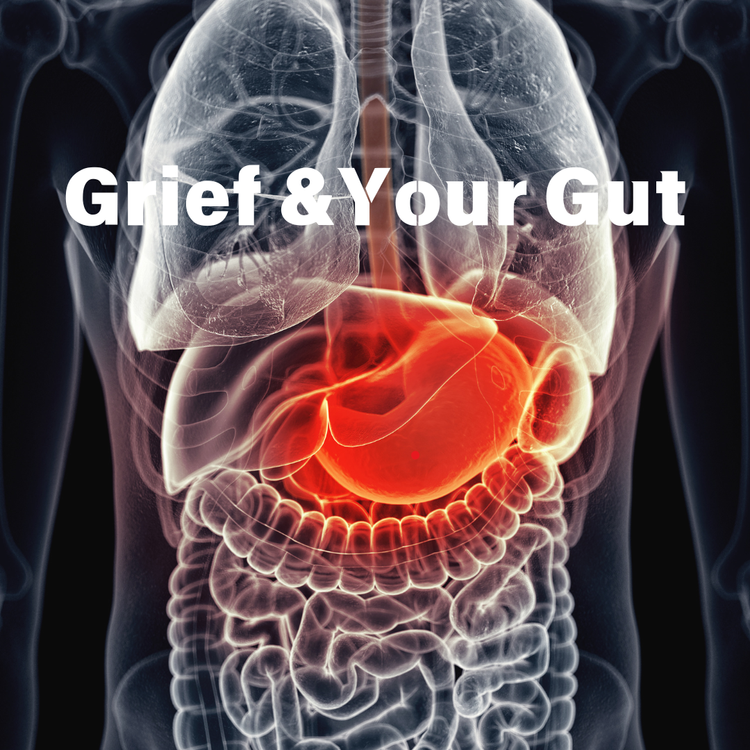Our gut, often referred to as our “second brain” is deeply affected by stress and emotions. During times of grief, the gut-brain connection can lead to digestive issues, disrupted appetite, and a heightened sensitivity to certain foods. Making it easy for our system to feel overwhelmed.
Your gut microbiome is a microscopic world within the world of your larger body. The trillions of microorganisms that live there affect each other and their environment in various ways. They also appear to influence many aspects of your overall health, both within your digestive system and outside of it.
This microbiome affects your immune system, nervous system, endocrine system and your overall general health. If your gut is off, YOU are off.
Digestive system problems such as heartburn, gas, bloating and constipation reflect what’s happening throughout your body. “As we age, the natural cycles slow down and don’t work as well,” says Johns Hopkins gastroenterologist Gerard Mullin, M.D.
How do you support your gut throughout The Year?
Eat Well.
The list of what you should and shouldn’t eat is overwhelming, so I’m breaking it down into simple, digestible (pun intended) chunks.
1. As best as you can, stay away from processed foods. These might taste good in the moment, but they are breaking down the walls of your microbiome and making you feel sick.
It’s actually quite simple; read your labels. If it contains more than 5 ingredients or ingredients you can’t pronounce, put it back…It’s not for you. I realize this takes extra time in the store and at home, preparing whole foods. This is the swap we make for our health. Once you start making the switch, your taste buds will start to change and the food you once thought was great actually doesn’t taste good at all. (This isn’t true of all junk foods…ice cream will always taste yummy.)
2. Avoid seed oils. This has gained a lot of attention in the news lately. The days of using Crisco and Vegetable are long gone. Ditch them. They’re inflammatory, and processed with carcinogenic chemicals.
Your best oils to cook with are ghee, avocado oil, olive oil, coconut oil and beef tallow. (I know this sounds contradictory to what we have been told for decades.) Ghee, avocado and coconut oils have a high burn temp, which means they can be cooked at higher temperatures and not burn. (This is good.) Think of olive oil as an oil you drizzle after the cooking is completed. Great for salads, over veggies and a beneficial oil to add the good fat into your diet. (Good fat helps your body metabolize and absorb the nutrients in your food.)
3. Eat Fermented Foods. Dishes such as Keifer, kimchi, sauerkraut and pickled veggies add probiotics that are easily digested into your diet. If these foods sound gross or impossible to add to your daily meals, check out this article on ideas for how to incorporate them.
4. Up The Fiber. Most Americans don’t take in enough fiber every day through fruits and vegetables. This is an important factor for building good bacteria and gut health. Metamucil is not your answer here…the best fiber comes from whole foods.
Eat a minimum of three servings of vegetables and two servings of fruit every day. This makes up the five-a-day recommended by the USDA's Dietary Guidelines for Americans. In general, one serving is a single piece of fruit or a half-cup of raw fruits or vegetables, or a cup of leafy greens.
Include fruits, vegetables, or both with every meal. For instance, include fruit with breakfast and as a snack, and vegetables with lunch and dinner.
Eat pulses (the seeds of plants in the legume family), such as beans, lentils, and peas, at least three times a week. You can include them either as a plant-based protein in meatless dishes, or as the starch side in place of grains. For example, you could have fish on a bed of lentils rather than rice.
Rely on nuts, seeds, and fruit for snacks. Or add them to other items like yogurt, oatmeal, salads, and stir-fries.
Replace refined grains like white rice with whole grains like brown rice, wild rice, or bulgur. For pasta, look for versions made from quinoa or pulses like chickpeas and lentils.
Check nutrition fact labels for the amount of dietary fiber. Aim for at least 5 grams of fiber per serving.
https://www.health.harvard.edu/staying-healthy/how-to-get-more-fiber-in-your-diet
Move Your Body.
Physical activity gets your colon moving, which leads to more regular bowel movements. Exercise can also help manage irritable bowel symptoms.
https://www.piedmont.org/living-real-change/10-tips-for-a-healthier-gut
Drink More Water.
If you’ve been here long enough, you’ve heard this from me before. Try adding electrolytes to your water to enhance your mineral intake, which is super important for your body. My friend Jennifer Carrillo of Be Rooted In Wellness does encourages us to remineralize our water, because many sources we get our water from are lacking what our body needs.
Limit alcohol and caffeine.
Alcohol can change the composition, or balance, of the gut microbiome. This can cause the gut microbiome to go from a state of homeostasis where everything is happy and calm into a state of dysbiosis where things start to go out of whack.
Limit sugar and artificial sweeteners.
“Too much sugar eliminates healthy gut bacteria, which can cause inflammation in the body—opening the door to bigger health problems. Also, refined sugars are rapidly digested by the first part of the small intestine, spiking your blood sugar and leaving the rest of your gut microbes hungry.”
https://www.patagoniaprovisions.com/blogs/learn/best-and-worst-foods-for-gut-health
9. Antibiotic Use. “Antibiotics are important medicines used to treat infections and diseases caused by bacteria. They work by either killing bacteria or preventing them from multiplying and have saved millions of lives over the past 80 years.
However, one of their drawbacks is that they affect both good and bad bacteria. In fact, even a single antibiotic treatment can lead to harmful changes in the composition and diversity of the gut flora.”
Use of antibiotics can lead to (Small intestinal bacterial overgrowth) SIBO, which many people are unaware they even have. Symptoms of SIBO include loss of appetite, abdominal pain, nausea, bloating, diarrhea, unintentional weight loss, malnutrition, persistent heartburn. Doctors often prescribe
https://www.healthline.com/nutrition/8-things-that-harm-gut-bacteria#TOC_TITLE_HDR_6
Chew your food thoroughly.
“Chewing your food properly is essential for adequate digestion. Meals should be eaten sitting down, in a relaxed environment to ensure that food is sufficiently chewed.”
Aim for Adequate Sleep
A good night’s sleep is important for supporting overall health as well as intestinal health. People should strive for 7-8 hours of sleep every night.
This information isn’t intended to overwhelm or guilt you, but merely to help you examine what may be causing your body pain. Grief is felt everywhere. Self-care is necessary to heal emotionally. My hope and prayer for you is that you give yourself the time and energy to care for yourself.
Resources:

